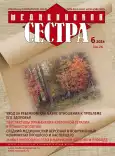The role of students’ extracurricular independent work in the formation of general and professional competences in graduates of medical college
- 作者: Ponkina N.P.1, Savina L.V.1, Sizova T.V.1
-
隶属关系:
- Saint Petersburg College of Midwifery
- 期: 卷 26, 编号 6 (2024)
- 页面: 26-29
- 栏目: Education: problems and solutions
- URL: https://journal-vniispk.ru/0025-8342/article/view/267026
- DOI: https://doi.org/10.29296/25879979-2024-06-05
- ID: 267026
如何引用文章
详细
The article considers the forms and possibilities of extracurricular independent work, which is an important component of the modern pedagogical process and allows to mobilise students for creative activity.
In modern conditions of medical education, the role of independent work of students, including extracurricular, which contributes to improving the quality of education, the formation of students’ desire for continuous self-education, the ability to independently acquire new knowledge and use them in their professional activities, is increasing.
The task of teachers of professional modules is not only to teach students a profession, but also to teach students to acquire knowledge, process it and apply it in various activities. Gradually the skill to choose information of professional nature in the general information flow is formed.
Independent work is one of the key factors that allows to transfer a student from a passive consumer of knowledge to an active participant.
The main reasons for the increasing role of independent work in mastering educational programmes of medical profile are reflected in the general and professional competencies of a specialist’s ability to organise his/her own activities, to make decisions in standard and non-standard situations, to search for and use information, as well as to independently determine the tasks of professional and personal development.
To develop students’ learning and cognitive activity we use various forms of extracurricular work.
The main figure in the organisation of independent work is the teacher, who directly manages the independent work of students in his discipline both individually and in a group.
The main tasks of the teacher in the management of independent work of students are:
- to assist students in organising independent work;
- to implement a differentiated approach to the organisation of independent work;
- to stimulate students’ interest in the in-depth study of the discipline;
- determine the scope of tasks for independent work in accordance with the programme;
- create methodological support for the discipline: teaching and methodical complex (TMC), control tasks (tests, problem tasks), topics of essays, term papers, etc.;
- to control independent work, evaluate and encourage students’ creative activity.
Thus, independent work is an autonomous activity of students, characterized by their independence and cognitive interest, which can be considered as a teacher-controlled independent cognitive activity of students.
作者简介
Nadezhda Ponkina
Saint Petersburg College of Midwifery
编辑信件的主要联系方式.
Email: ponkinan@bk.ru
ORCID iD: 0009-0008-7124-7760
Teacher of Professional Modules
俄罗斯联邦, Saint PetersburgLyudmila Savina
Saint Petersburg College of Midwifery
Email: mkakush@zdrav.spb.ru
ORCID iD: 0000-0002-2996-1388
Teacher of Professional Modules
俄罗斯联邦, Saint PetersburgTatyana Sizova
Saint Petersburg College of Midwifery
Email: mkakush@zdrav.spb.ru
ORCID iD: 0009-0001-4359-6081
Teacher of Professional Modules
俄罗斯联邦, Saint Petersburg参考
- Botsmanova N.V. Development of professional competence in the system of secondary vocational education. Theory and practice of education in the modern world: materials of the VI International Scientific Conference (St. Petersburg, December 2014) St. Petersburg, Zanevskaya Ploshchad, 2014.
- Dyatlova K.D., Kolpakov I.A. Independent work of students as a way to form competences. Bulletin of Nizhny Novgorod University named after N.I. Lobachevsky. 2012; (1–1): 25–28.
- Arkhangelsky, S.I. Learning process in higher school and its regular bases and methods. Moscow: Higher School, 1980. 368 p.
- Molibog, A.G. Questions of scientific organisation of pedagogical work in higher school. A.G. Molibog. Minsk: Higher School, 1975.
- Koroleva, T.A. Independent work of students as the most important factor of intensification of the educational process. Young scientist. 2019; 273 (35): 128–131.
- Olisova M.M. Organisation of students’ independent work as the most important component in students’ professional education. Pedagogical Journal. 2019; 9 (2–1): 378–385.
- Alekseeva L.P. Provision of independent work of students. Specialist. 2010; (6): 108–112.
- Gheorghe I.V. Principles of organisation of independent work of students in the process of professional training. Srednee vocational education. 2009; (11): 52–54.
补充文件








